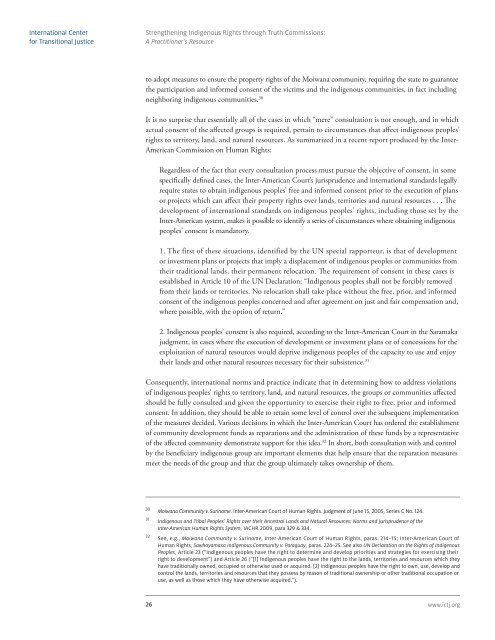Strengthening Indigenous Rights through Truth Commissions: A ...
Strengthening Indigenous Rights through Truth Commissions: A ...
Strengthening Indigenous Rights through Truth Commissions: A ...
- No tags were found...
You also want an ePaper? Increase the reach of your titles
YUMPU automatically turns print PDFs into web optimized ePapers that Google loves.
International Centerfor Transitional Justice<strong>Strengthening</strong> <strong>Indigenous</strong> <strong>Rights</strong> <strong>through</strong> <strong>Truth</strong> <strong>Commissions</strong>:A Practitioner’s Resourceto adopt measures to ensure the property rights of the Moiwana community, requiring the state to guaranteethe participation and informed consent of the victims and the indigenous communities, in fact includingneighboring indigenous communities. 30It is no surprise that essentially all of the cases in which “mere” consultation is not enough, and in whichactual consent of the affected groups is required, pertain to circumstances that affect indigenous peoples’rights to territory, land, and natural resources. As summarized in a recent report produced by the Inter-American Commission on Human <strong>Rights</strong>:Regardless of the fact that every consultation process must pursue the objective of consent, in somespecifically defined cases, the Inter-American Court’s jurisprudence and international standards legallyrequire states to obtain indigenous peoples’ free and informed consent prior to the execution of plansor projects which can affect their property rights over lands, territories and natural resources . . . Thedevelopment of international standards on indigenous peoples’ rights, including those set by theInter-American system, makes it possible to identify a series of circumstances where obtaining indigenouspeoples’ consent is mandatory.1. The first of these situations, identified by the UN special rapporteur, is that of developmentor investment plans or projects that imply a displacement of indigenous peoples or communities fromtheir traditional lands, their permanent relocation. The requirement of consent in these cases isestablished in Article 10 of the UN Declaration: “<strong>Indigenous</strong> peoples shall not be forcibly removedfrom their lands or territories. No relocation shall take place without the free, prior, and informedconsent of the indigenous peoples concerned and after agreement on just and fair compensation and,where possible, with the option of return.”2. <strong>Indigenous</strong> peoples’ consent is also required, according to the Inter-American Court in the Saramakajudgment, in cases where the execution of development or investment plans or of concessions for theexploitation of natural resources would deprive indigenous peoples of the capacity to use and enjoytheir lands and other natural resources necessary for their subsistence. 31Consequently, international norms and practice indicate that in determining how to address violationsof indigenous peoples’ rights to territory, land, and natural resources, the groups or communities affectedshould be fully consulted and given the opportunity to exercise their right to free, prior and informedconsent. In addition, they should be able to retain some level of control over the subsequent implementationof the measures decided. Various decisions in which the Inter-American Court has ordered the establishmentof community development funds as reparations and the administration of these funds by a representativeof the affected community demonstrate support for this idea. 32 In short, both consultation with and controlby the beneficiary indigenous group are important elements that help ensure that the reparation measuresmeet the needs of the group and that the group ultimately takes ownership of them.303132Moiwana Community v. Suriname. Inter-American Court of Human <strong>Rights</strong>. Judgment of June 15, 2005, Series C No. 124.<strong>Indigenous</strong> and Tribal Peoples’ <strong>Rights</strong> over their Ancestral Lands and Natural Resources: Norms and Jurisprudence of theInter-American Human <strong>Rights</strong> System, IACHR 2009, para 329 & 334.See, e.g., Moiwana Community v. Suriname, Inter-American Court of Human <strong>Rights</strong>, paras. 214–15; Inter-American Court ofHuman <strong>Rights</strong>, Sawhoyamaxa <strong>Indigenous</strong> Community v. Paraguay, paras. 224–25. See also UN Declaration on the <strong>Rights</strong> of <strong>Indigenous</strong>Peoples, Article 23 (“<strong>Indigenous</strong> peoples have the right to determine and develop priorities and strategies for exercising theirright to development”) and Article 26 (“[1] <strong>Indigenous</strong> peoples have the right to the lands, territories and resources which theyhave traditionally owned, occupied or otherwise used or acquired. [2] <strong>Indigenous</strong> peoples have the right to own, use, develop andcontrol the lands, territories and resources that they possess by reason of traditional ownership or other traditional occupation oruse, as well as those which they have otherwise acquired.”).26www.ictj.org
















